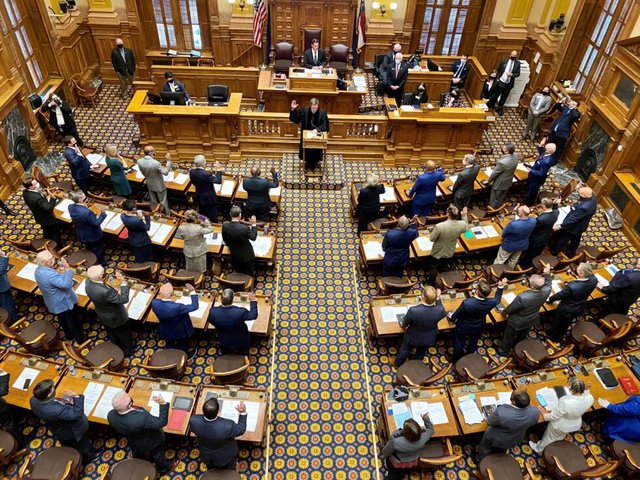Election 2021: Georgia lawmakers brace for fight over mail-in voting – Forsyth County News Online

ATLANTA – The battle for votes in Georgia is set to leap from the ballot box to the state Capitol as legislative Republicans look to clamp down on vote-by-mail rules Democrats have championed amid recent electoral wins.
Though no major election bills were introduced in the 2021 legislative session’s first week, state Republican leaders have placed Georgia voting laws in their crosshairs since the Nov. 3 presidential election, framing proposed changes as needed to boost election integrity following record-setting absentee voting.
Democratic state lawmakers are readying for a fight. Already, they have taken to podiums and press conferences at the Capitol to thrash proposed mail-in voting changes as modern-day voter suppression aimed at halting Democratic gains in recent election cycles.
In particular, Republicans in the Georgia Senate last month called for ending no-excuse absentee voting, which since 2005 has allowed registered Georgia voters to request and cast mail-in ballots for any reason and not just if they are out-of-state, elderly or disabled.
Some top Republican lawmakers and officials have been cold to that idea, preferring instead to focus on adding stricter voter identification requirements for casting absentee ballots than the signature-verification process that stirred controversy in the 2020 election cycle.
Legislation on mail-in voting may have to clear a new committee on election access and oversight being formed by Georgia House Speaker David Ralston, R-Blue Ridge, before passing the legislature. Ralston has said he wants bills to address “perceived problems” many Georgians had with the 2020 elections.
“Many Georgians are concerned about the integrity of our election system,” Ralston said. “Many of those concerns may or may not be well-founded, but there may be others that are.”
Nixing no-excuse absentee
The pivot to election-law changes in the state legislature comes after Georgia voters cast record-setting numbers of absentee ballots in the 2020 primary, general and runoff elections, spurred by fears over voting in person during the COVID-19 pandemic.
Mail-in votes topped one million in all three election rounds, far exceeding past Georgia election cycles. The huge vote-by-mail turnout helped Democrats win the presidential contest in Georgia and flip both of the state’s U.S. Senate seats for the first time in decades.
That outcome drew an intense backlash from the losing candidate, President Donald Trump, who insisted Georgia’s election system was “rigged” by fraud even as the state’s Republican elections chief and federal courts rejected his claims.
The outcry from Trump supporters was enough for Republican state lawmakers to hold four hearings on election fraud claims, each concluding that changes should be in order for how Georgians can vote by mail in future elections.
“There’s a lot of trust issues and confidence issues we have to try to restore around the state,” said Georgia Senate Majority Whip Steve Gooch, R-Dahlonega. “I do not want to suppress the vote. … But we want to make sure every legal vote is counted.”
Gooch and other members of the Senate Republican Caucus have pledged to shrink who can request an absentee ballot, effectively overturning the state’s no-excuse absentee voting law that Republicans sponsored in 2005 under then-Gov. Sonny Perdue.
That proposal has backing from Georgia Secretary of State Brad Raffensperger, a Republican who faced attacks from Trump and his allies for not reversing the state’s election results. He has said the flood of absentee ballots put too much pressure on local election officials as they raced to count votes under the heat of national scrutiny following the Nov. 3 election.
“Until COVID-19, absentee ballot voters were mostly those who needed to cast absentee ballots,” Raffensperger said. “For the sake of our resource-stretched and overwhelmed elections officials, we need to reform our absentee ballot system.”
But putting the squeeze on mail-in voting could face hurdles even within Republican ranks after Ralston recently said he won’t back the change unless “a real strong case” can convince him otherwise. Instead, he called for absentee voting to have the same “level of security” as in-person voting.
*** This article has been archived for your research. The original version from Google News can be found here ***


